
Anno 301 - 400

|
Popes on Parade Anno 301 - 400 |
POPshop |
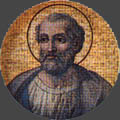 |
Saint MarcellinusAnno 296-304 |
Little is known of Marcellinus, except that he had the misfortune of being Pope when, in 303, the Emperor Diocletian co-signed the order of his subordinate, Augustus Galerius, to begin the most thorough and destructive persecution of Christians throughout the Roman Empire. Thousands of people were slaughtered. Churches were demolished, books and records were burned, and all making use of a court of law were required to burn incense to the gods or suffer death. Tradition has it that Marcellinus broke down, bowed to the imperial command, and offered incense in court. Condemned for his apostasy, he was deposed. He repented prior to his execution, however, and died a martyr if not a Pope. How much of this story is true is anybody's guess, as the ancient historians were very cagey about Marcellinus. Many of them simply left him out of their histories. Eusebius, the "Father of Church History", only has one (rather mysterious) mention of Pope Marcellinus: "the persecution also affected him". |
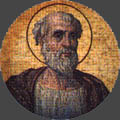 |
Saint Marcellus IAnno 307-309 |
An Italian, possibly from Rome. For three long years following the Diocletian persecutions, the chair of Peter stood empty. Under his tolerant successor, Emperor Maxentius, the Christians enjoyed relative peace. Pope Marcellus tried to reorganize the Roman Church; much of its land and buildings had been siezed or destroyed, and many Christians had renounced their faith during the persecution. These apostates were called lapsi, and when the Pope insisted they perform public penance before being admitted back into the Church, they pitched a fit. Following a spate of rioting, bloodshed, and the odd looting by the lapsi, the Emperor decided that it must somehow be the Pope's fault. Poor old Marcellus was sent into exile, where he more or less immediately died. |
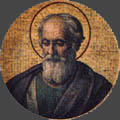 |
Saint EusebiusAnno 310 |
A Greek physician. The new Pope was given marching orders by the Emperor to bring the lapsi under control. Eusebius held firm to Marcellus' view that the lapsi must perform penance before being readmitted to the Body of Christ. The Pope was assailed from both sides: critics argued that the lapsi shouldn't be readmitted at all. The lapsi, meanwhile, had organised themselves under Heraclius (who had actually lapsed before the persecutions began). Heraclius and his followers tried to enter a church by force. Much rioting ensued. Emperor Maxentius sent both Pope Eusebius and the lapsi leader Heraclius into exile in Sicily, probably hoping they'd throttle each other to death. Eusebius died in exile after a pontificate of only six months. |
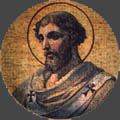 |
Saint MiltiadesAnno 311-314 |
An African. Elected after an extended vacancy caused by the ongoing lapsi crisis. An edict of toleration signed by the Emperors Galerius, Licinius, and Constantine ended the persecutions. Christians were allowed to live and worship openly. Only in the easternmost quarter of the empire ruled by Maximinus Daia did the persecutions continue. Pope Miltiades won the right to receive back all church buildings and possessions that had been confiscated during the persecutions. He continued the administrative rebuilding begun under Pope Marcellus. Following his victory at the Milvian Bridge in 312, the Emperor Constantine converted to Christianity. This is so important, it deserves to be repeated. Following his victory at the Milvian Bridge in 312, the Emperor Constantine converted to Christianity. In a single moment, the entire history of the world was changed. From being a persecuted minority, Christianity overnight became essentially the state religion of the Roman Empire. To demonstrate his devotion, Constantine donated the Lateran Palace to the Church, and it became the residence of the Popes for a thousand years; the attached basilica became St. John Lateran, the principal church of Rome. The Christians had arrived. The Imperial government, however, left. Constantine moved the capital to the town of Byzantium in the east, renaming it Constantinople in his own honour. After this, the Pope pretty much became the de facto authority in the city of Rome. |
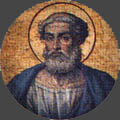 |
Saint Sylvester IAnno 314-345 |
Little is known of Sylvester's early life. Even his place of birth is unknown. Part of the problem, of course, is that he was totally overshadowed by the personality of the Emperor. Another problem is his amazing ability to be anywhere except where the action is. You could almost play a demented sort of "Where's Waldo?" game with Sylvester's pontificate. Where's Sylvester? Did he condemn the heretic Arius? Nope. Did he attend the Church Council at Arles? No. How about the Ecumenical Council of Nicæa? No again. In all fairness, he did send delegates to both Councils, and there's some pretty good evidence that he and the Emperor privately worked out the draft of what would become the Nicæan Creed before the Council even convened. But really, would it have killed him to show up? Sylvester is credited with helping develop the Roman liturgy, establishing the Roman school of singing, and commissioning the first martyrology of Roman martyrs. |
 |
Saint MarcusAnno 336 |
An Italian from Rome; son of Priscus. In his eight months as Pope, Marcus founded the Church of San Marco in Rome and studiously ignored the Arian heresy raging in the east. |
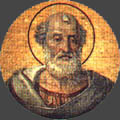 |
Saint Julius IAnno 337-352 |
An Italian from Rome; son of Rusticus. Following the death of Emperor Constantine the Great in 337, Pope Julius dove into the Arian problem. He summoned a Synod at Rome in 340 to see if they could straighten out the issue of the followers of Arius electing their own bishops and forcibly driving the orthodox bishops out of town. Athanasius, Patriarch of Alexandria, had been thrown out of his see not once, but twice, finally ending up in Rome begging the Pope's help. The rebel bishops, now under the rule of Eusebius of Constantinople, didn't bother showing up. The Pope asked Emperor Constans to intervene, thereby setting a precedent that would haunt the Popes for the next 1500 years. Another Council was held, this one in Sardica. It specified the procedures to be used against bishops accused of crimes or heresy, and the manner of the papal intervention in these cases was clearly defined. The edicts of the Council were implemented only slowly, though at least two of the Eusebian bishops came to Rome to recant. Julius founded many churches, including Santa Maria in Trastevere where he is buried. |
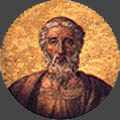 |
LiberiusAnno 352-365 |
An Italian from Rome. Liberius is the first Pope not to be a Saint. The Christians were moving up in the world, and the Emperor Constanius II was determined to keep the peace of the empire by mending the split between the orthodox and the Arians. Unfortunately, his solution was to embrace Arianism and force the orthodox bishops to capitulate. The Emperor figured if he could get the Pope to go along with him, the rest of the bishops would fall in line. So he sent the eunuch Eusebius to Rome to bribe Liberius. The Pope was furious. He refused the "gifts", threw Eusebius out of the Lateran, and upbraided his guards for admitting him (it?) in the first place. For good measure, he excommunicated the Arians and any who supported them. Now it was the Emperor's turn at fury. He had the Pope kidnapped and brought to him at Milan. When the Pope refused to submit, he was banished to Beraea in Thrace. The Emperor appointed the Archdeacon Felix to be the new Pope, setting a precedent that the Papacy wouldn't shake off until the 19th Century. The Roman people, meanwhile, were having none of it. They demanded the return of their Pope. It was a classic standoff between Emperor and Pope, the first of many, and the Pope blinked first. In 357, Liberius signed a compromise deal with the Arians, and returned to Rome. The people threw him a parade, and Liberius, feeling cocky, denied he'd ever made the deal. After the death of the Emperor in 361, Liberius again stepped up his campaign against the Arians, sending so many letters of condemnation that they often hadn't opened the envelope before a new one arrived. Even so, it was not enough to get his reputation back, and in death sainthood has eluded him. |
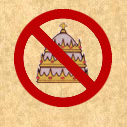 |
Felix II(Antipope) |
The Archdeacon Felix has the distinction of being the first "Pope" appointed by an Emperor. He's not the last by a long shot. He was consecrated by a pair of Arian bishops, and the people of Rome would have nothing to do with him. After the return of Liberius, Felix was run out of Rome. He "retired" to Porto and died a few years later. |
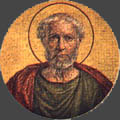 |
Saint Damasus IAnno 366-384 |
Born c. 305 in Rome. Son of Antonius and Laurentia of Hispania. After the death of the popular Liberius, riots erupted in Rome between the factions of Damasus and Ursinus. Damasus was elected by a large majority, but a number of Liberius' followers wanted Ursinus instead, and they attempted to install him by force. This did not impress the Emperor Valentinian, who sent Ursinus into exile. As Pope, Damasus spent his time trying to convert wealthy Roman matrons, supposedly on the theory that where the wives go, the husbands will follow. This led (as it often does) to charges of adultery. Damasus was cleared of the charges, and spent the rest of his pontificate staying away from little old ladies and instead continued the struggle against heresy (this time Apollinarianism and Macedonianism). The Papal Court blossomed under the force of his personality and his charm. Even St. Jerome was persuaded to be his secretary. The Emperor Theodosius was so impressed with Damasus, he ordered "all the inhabitants of the empire" to follow "the form of religion handed down by the Apostle Peter to the Romans, and now followed by Bishop Damasus". |
 |
Ursinus(Antipope) |
A deacon of the Roman Church. The most radical followers of the dead Pope Liberius tried to install Ursinus in the Lateran with fire and sword. He died an exile. |
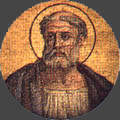 |
Saint SiriciusAnno 384-399 |
Born c. 334 in Rome. Son of Tiburtius. He entered the Church as a boy and served as a deacon under Popes Liberius and Damasus. Siricius was elected unanimously, much to the irritation of both the "retired" antipope Ursinus and St. Jerome. From the beginning, Siricius was a strong defender of Papal prerogatives. He answered questions of dogma and settled disputes for bishops from Spain to Antioch. A friend of St. Ambrose in Milan, Siricius took a hard line against heresy, not hesitating to condemn even bishops. For the first time, the judicial machinery of the Empire was turned against heresy: the Emperors Honorius and Valentinian III declared the Manichæans to be political criminals and had them executed. Siricius was the first bishop of Rome to use the title "Pope" in the modern sense. You just didn't mess around with him if you knew what was good for you. |
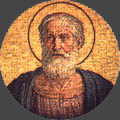 |
Saint Anastasius IAnno 399-401 |
An Italian from Rome. Anastasius had the singular misfortune of being Pope during the beginning of the barbarian invasions of the West. While the brittle Imperial frontier was showing its first cracks, Anastasius frittered away his time. He allowed himself to be convinced by his friend St. Jerome to condemn the writings of the third century theologian Origen, sight unseen. |
Complete List of Popes
First Century |
Second Century |
Third Century |
Fourth Century |
Fifth Century
Sixth Century |
Seventh Century |
Eighth Century |
Ninth Century |
Tenth Century
Eleventh Century |
Twelfth Century |
Thirteenth Century |
Fourteenth Century |
Fifteenth Century
Sixteenth Century |
Seventeenth Century |
Eighteenth Century |
Ninteenth Century |
Twentieth Century
Twenty-First Century
Ecumenical Councils | Papal Box Scores